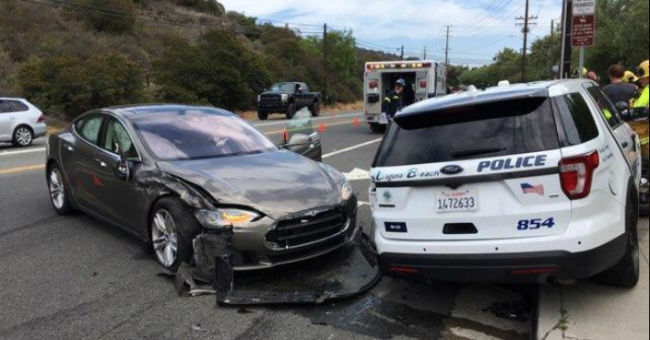A Tesla sedan set to autopilot mode crashed into a parked Laguna Beach Police Department vehicle in Laguna Beach, Calif., authorities said.

The driver of the Tesla sustained minor injuries after the Tuesday morning crash, according to public information officer Sgt. Jim Cota. The police officer was not in the SUV at the time of the crash.
Sgt. Cota said the crash occurred in the same area where a Tesla rammed into a semi last year, the San Diego Union-Tribune reported.
“Why do these vehicles keep doing that? We’re just lucky that people aren’t getting injured,” Sgt. Cota said.

Get daily National news
Also on Tuesday, Greek police said the driver of a Tesla Model 3 blamed a malfunction in the car’s autopilot feature for a crash in a highway in northern Greece last week. No one was injured in the accident, and the driver didn’t break any driving laws.
READ MORE: Why billionaire Elon Musk wants to start a journalist ranking website
Tesla’s autopilot feature has attracted heavy scrutiny after a number of crashes.
Earlier this month, a vehicle in autopilot mode crashed into a stopped firetruck near Salt Lake City, Utah, injuring two people.
READ MORE: Tesla in autopilot mode accelerated seconds before crashing into firetruck, say police
A Tesla also rammed into a fire truck on the scene of an accident in Culver City, Calif. in January, with the driver telling authorities that the vehicle was on autopilot at the time.
In March, Apple engineer Walter Huang was killed in a crash after his Tesla X crashed in Mountain View, Cali., although Tesla blamed the crash on Huang not paying attention to the road despite multiple warnings from the car to do so.
Tesla’s owners manuals state that the Enhanced Autopilot mode, which partially automates steering and braking, isn’t intended to completely take over the role of a human driver, and warns that drivers must still keep their hands on the wheel and pay attention.
But consumer watchdog groups say Tesla’s use of the word “autopilot” in its branding and marketing is misleading.
Last week, the Center for Auto Safety and Consumer Watchdog called on the Federal Trade Commission to investigate Tesla’s marketing practices, and accused the company of “deceiving and misleading consumers into believing its vehicle’s Autopilot feature is safer and more capable than it is in practice.”
Tesla has said the use of Autopilot results in 40 percent fewer crashes, a claim the U.S. National Highway Traffic Safety Administration repeated in a 2017 report on the first fatality, which occurred in May 2016. Earlier this month, however, the agency said regulators had not assessed the effectiveness of the technology.
— With files from Reuters and the Associated Press








Comments